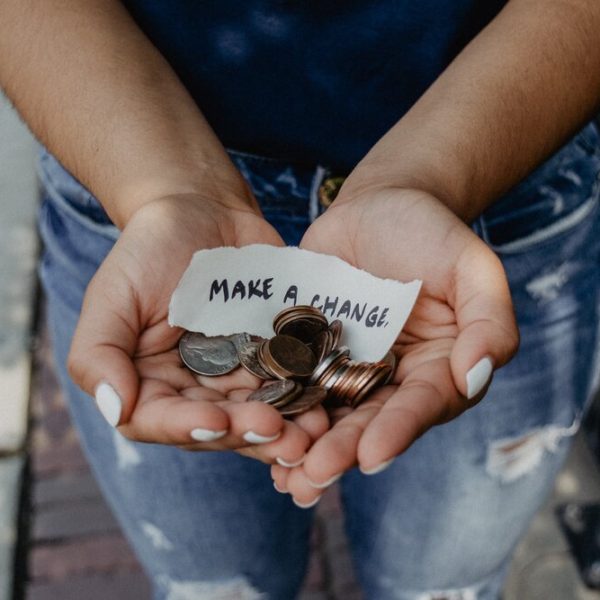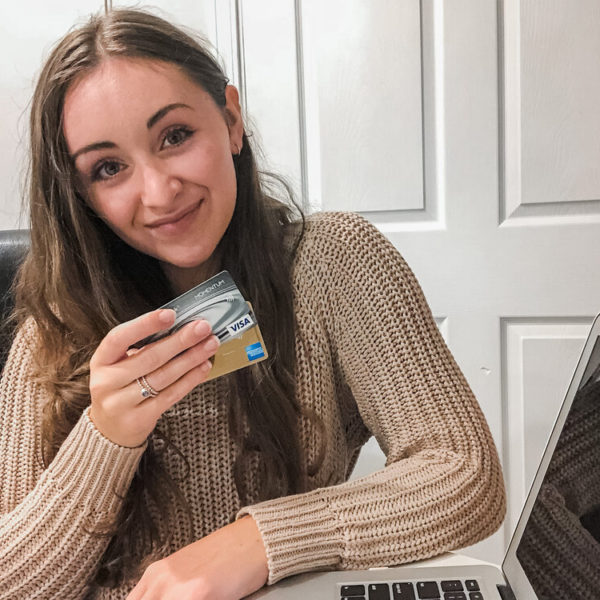When I started my first “real job” in May of 2018, the only thing I knew I should do with my paycheque was transfer a portion into my savings account. For what purpose? I had no clue, but I figured that it was a good thing to do.
Fast forward a couple of years, I have tens of thousands of dollars invested in the stock market, over ten thousand dollars in savings for specific purposes and I have created a sustainable spending plan that works for me.
Money can be a really stressful topic but it doesn’t have to be. Here are 7 ways to better your finances today. You can do it!
1. Switch Banks
Sorry to have to be the one to tell you this, but unless you have hundreds of thousands of dollars in the bank, your bank probably doesn’t care about you.
Are you paying fees when you don’t need to? Go find a no-fee account somewhere else. Want unlimited e-transfers? You betcha. Unlimited transactions? No problem. Do some research and find a bank that works for you. They’re out there I promise!
Related Article
2. Open A High Interest Savings Account
One of the best ways to better your finances is to open a high interest savings account. I cannot stress this enough. This is literally the simplest thing you can do to put hundreds, even thousands of dollars back into your pocket every year. Why settle for a 0.05% interest rate at one bank when you can make literally 30x that amount somewhere else?
I don’t think anyone has ever regretted opening a high interest savings account, they’ve only regretted not opening one sooner. Personally, I use EQ Bank and recommend them to everyone I know!
3. Create Goals
What would you like money to give you the freedom to do? Really take a second to think about it.
Do you want to own a home? Would you like to pay off your student loan? Are you dreaming of travelling at least once a year? Whatever your goal is, write it down. Start with a dream, make it a goal and break it down into actionable steps. Your dreams aren’t stupid. Find a way to make them happen!
Related Article
4. Start A Budget
I still kick myself for not knowing how to budget in university when it was really just a simple google search away. I would work multiple jobs every summer, hold a part-time job during the school year and somehow could not make it past December every single year without calling my parents for help. Where was my money going? Honestly, I couldn’t tell you. I know I wasn’t spending crazy money but I also know I could have planned out my spending more wisely to really make it last.
Since I’ve started budgeting, I have invested well over $30K, saved over $10K and learned to spend money on things that truly matter to me.
Remember, budgeting is not about deprivation, it’s about prioritization. Here are the important things to consider when creating a budget.
- First things first, what do you need to spend your money on? Rent? Utilities? Groceries? Make sure you set aside funds to cover the necessities first.
- Next, you’ll want to pay yourself first and transfer some money to savings before you spend it. What are the goals you are working towards? How can you make those happen? If you wait until the end of the month to transfer what’s left over, chances are there won’t be anything left.
- Whatever’s left after setting aside money for your fixed expenses and savings/investments is yours to spend however you see fit. Want to spend $500 on makeup and skin care every month? No one is stopping you, go right on ahead. Just make sure that your purchases truly make you happy and please make sure you can pay your rent on time and feed yourself!
Related Articles
How To Create An Effective Spending Plan
5. Check Your Credit Score And Increase It
Credit scores are so important in our 20s and 30s. It’s basically a number that tells lenders how trustworthy we are with money.
Do you know what your credit score is? You’re going to need to check that out if you’re not quite sure. If it turns out that it’s not as high as you would have liked, let’s start working towards increasing that so that when the times comes to show a lender how reliable you are, you can knock their socks off.
Why should you even care about your credit score? Well, there are lots of instances where you’ll want to have a soaring credit score but here are a few examples where your credit score really matters:
-
Want to rent that nice apartment downtown? Chances are the landlord will want to know you’re the type of person who pays their bills on time. They’ll be able to gauge that by asking for your credit score.
-
Dreaming of buying a house in a few years? The interest rate you can get for your mortgage will be based on your credit score. The better the score, the lower the interest rate. This could be the difference of hundreds thousands of dollars over your lifetime. Ya, I did say hundreds of thousands… Just think about what you could do with an extra few hundred thousand dollars in the bank.
Related Articles
How To Check Your Credit Score
5 Things That Affect Your Credit Score
The Ultimate Guide To Credit Cards
6. Ditch The Mutual Fund Investments
Somehow, mutual funds are the most common investments in Canada but they are quite literally the worst. Wave goodbye to those mutual funds (or just please don’t open an account at the bank if you haven’t started investing already) and look into some better investment options. Again, this is another one of those extra hundreds of thousands of dollars in the bank over time situations. Do you think the financial advisors (aka salespeople) that sell you mutual funds are investing in them themselves? Of course not. The financial advisors know mutual funds are not good financial products but they’re sure not going to tell you that… they want you to buy them!
Related Article
The Basics of Investing in Canada
7. Invest For Retirement
I know it may sound like a future you problem but as soon as we start working, the vast majority of us should start investing for retirement.
Don’t forget to ask if the company you work for offers a retirement plan with a company match. It’s usually about 4%. All this means is if you put 4% of your paycheque into the company RRSP, they’ll match your 4%. That’s free money! Most of the time it will be a mutual fund (sigh), but put your blinders on and get that free money.
If your company doesn’t offer a retirement plan, don’t worry, simply set up an investment account for yourself. Even if you do have a company match, you may want to have some additional investments on your own as well. Maybe you’re not sure if an RRSP account is right for your situation. No problem! You really can’t go wrong with a TFSA. Starting to invest early is the key to success because the earlier you start, the less you’ll have to put away of your own money in the long run. The compounding effect is sure a beautiful thing!
Related Articles
What Is The Retirement Registered Savings Plan (RRSP)?
What Is The Tax-Free Savings Accounts (TFSA)?
When Is The Best Time To Start Investing?
Disclaimer: I am not a certified financial planner or investment advisor. The ideas posted on this website are my own opinions on how I manage my personal finances. The content is specifically for educational and informational purposes and is not considered professional financial advice. Everyone’s finances work differently and you will have to do your own due diligence before making any financial decisions.
Pin it for later!









Budgeting is a cornerstone to managing one’s finances. Thank you for a very thorough article and l like the template too!
You really packed a punch with this blog!